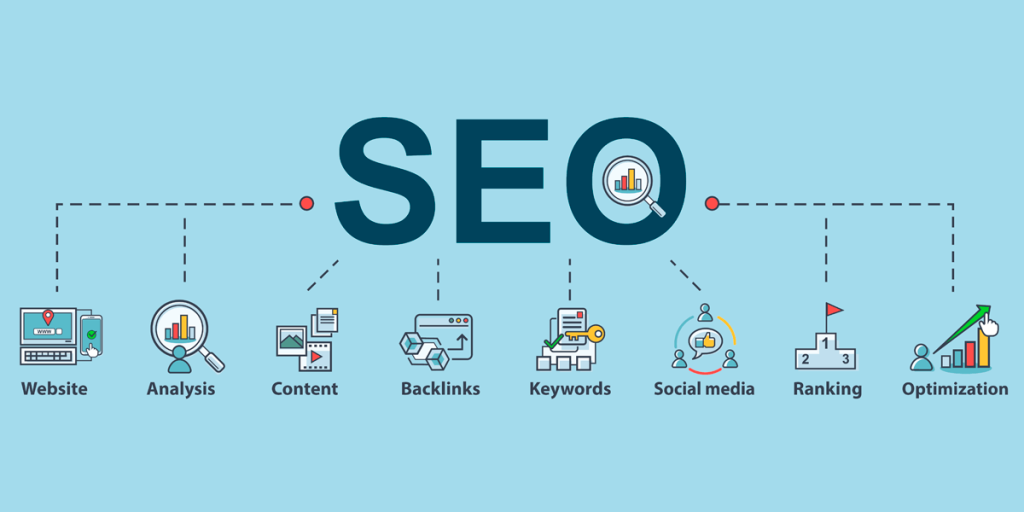SEO in Digital Marketing
In the ever-evolving landscape of digital marketing, Search Engine Optimization (SEO) plays a pivotal role. It’s not just a buzzword; it’s the lifeline of online visibility and success. But what is SEO in digital marketing? How does it work, and why is it so vital?
This article aims to demystify the world of SEO and its significance in the realm of digital marketing. We’ll break down the fundamentals, strategies, challenges, and everything you need to know to harness the power of SEO for your online success.
Understanding SEO
What is SEO?
SEO, or Search Engine Optimization, is the practice of enhancing your website’s visibility in search engine results pages (SERPs). When someone searches for a term related to your business, you want your website to appear at the top. SEO helps you achieve that.
How SEO Works
SEO operates through a combination of on-page, off-page, and technical strategies. It involves optimizing your website’s content, ensuring it’s relevant to the search queries you want to rank for. Off-page SEO entails building high-quality backlinks, and technical SEO ensures that your website is crawlable and user-friendly.
Why SEO Matters
The importance of SEO in digital marketing cannot be overstated. It’s the primary driver of organic (non-paid) traffic to your website. By optimizing your site, you’re essentially making it more attractive to search engines like Google, which, in turn, leads to higher rankings. These higher rankings result in increased visibility, traffic, and ultimately, business success.
SEO Elements
SEO is a multifaceted field, with various elements working in harmony to improve your website’s search visibility. Let’s take a closer look at some of the key elements:
On-Page SEO
On-page SEO focuses on optimizing individual pages of your website to rank higher in search results. Key aspects include:
- Keyword Research and Optimization: Identifying and using relevant keywords that your target audience searches for.
- Content Quality and Relevance: Creating high-quality, informative content that caters to the needs of your audience.
- Meta Tags and Headings: Optimizing meta titles, descriptions, and headings for search engines.
- Mobile Optimization: Ensuring your website is mobile-responsive for a seamless user experience.
Off-Page SEO
Off-page SEO revolves around building your website’s authority and reputation on the web. Key elements include:
- Backlink Building: Acquiring high-quality backlinks from authoritative websites.
- Social Media Signals: Leveraging social media platforms to amplify your online presence.
- Guest Posting: Collaborating with other websites to publish content and gain exposure.
Technical SEO
Technical SEO deals with the technical aspects that impact your site’s performance in search results. It includes:
- Site Speed and Performance: Ensuring your website loads quickly and functions smoothly.
- Mobile Responsiveness: Make sure your site is accessible and user-friendly on mobile devices.
- Structured Data Markup: Implementing structured data to enhance search engine understanding of your content.
The Significance of SEO in Digital Marketing
SEO’s importance in digital marketing is evident in various ways:
SEO and Organic Traffic
SEO is the driving force behind organic traffic, making it a cost-effective way to attract visitors to your website. By optimizing your content for search engines, you can reach users who are actively searching for information or products related to your business.
Enhancing User Experience
A core part of SEO involves improving the user experience on your website. This results in faster load times, easy navigation, and user-friendly design—all of which contribute to higher rankings and better user satisfaction.
SEO and Content Strategy
SEO and content strategy go hand in hand. Creating valuable, relevant content is essential for SEO success. The content you produce not only satisfies search engine algorithms but also engages and informs your target audience.
Key SEO Strategies
Achieving success in SEO requires a well-thought-out strategy. Let’s delve into the primary strategies that can help you optimize your website for search engines and boost your online presence.
On-Page SEO Strategies
On-page SEO involves optimizing individual web pages to improve their search engine rankings. Here are some essential on-page strategies:
Keyword Research and Optimization
- Keyword Research: Start by identifying relevant keywords that your target audience is searching for. Tools like Google Keyword Planner can assist in this process.
- Keyword Placement: Integrate these keywords strategically into your content, including headings, body text, and meta tags.
- Quality Content: Create valuable, informative content around your chosen keywords. This not only improves SEO but also engages your audience.
Meta Tags and Headings
- Meta Titles and Descriptions: Craft compelling meta titles and descriptions that accurately represent the content on your page. These elements appear in search results and significantly impact click-through rates.
- Heading Tags (H1, H2, H3, etc.): Organize your content with headings. Use H1 for the main title and subheadings (H2, H3, etc.) to structure the page.
Mobile Optimization
- Mobile-Responsive Design: Ensure your website is mobile-responsive, providing a seamless experience for users on smartphones and tablets. Mobile-friendliness is a key ranking factor in Google’s algorithm.
Off-Page SEO Strategies
Off-page SEO focuses on actions taken outside of your website to enhance its online authority. Here are some vital off-page strategies:
Backlink Building
- High-Quality Backlinks: Acquire backlinks from reputable and authoritative websites within your industry. Quality matters more than quantity.
- Natural Link Building: Foster natural backlinks by creating exceptional content that others naturally want to link to.
Social Media Signals
- Social Media Presence: Maintain an active presence on social media platforms. Sharing your content and engaging with your audience can enhance your online visibility.
- Social Sharing: Encourage social sharing of your content to reach a broader audience.
Guest Posting
- Collaborative Content: Partner with other websites to publish guest posts. This not only builds backlinks but also exposes your content to new audiences.
- Relevance and Quality: Ensure that the websites you guest post on are relevant to your industry, and maintain the quality of your contributed content.
Technical SEO Strategies
Technical SEO addresses the technical aspects of your website that influence search engine rankings. Here are key technical strategies:
Site Speed and Performance
- Fast Loading Times: Optimize your website for fast loading times. Slow-loading pages can negatively impact user experience and SEO rankings.
- Content Delivery Network (CDN): Use a CDN to distribute your website content across multiple servers, reducing latency.
Mobile Responsiveness
- Mobile-Friendly Design: Implement a responsive web design that adjusts to various screen sizes. Google prioritizes mobile-friendly websites in its rankings.
Structured Data Markup
- Schema Markup: Use structured data markup to provide search engines with additional information about your content. This can lead to rich search results, known as “rich snippets.”
In the following sections, we’ll explore how to measure SEO success, address common challenges, and answer frequently asked questions about SEO in digital marketing.
Measuring SEO Success
Measuring the success of your SEO efforts is essential to determine the effectiveness of your strategies and make informed decisions. Here are key aspects to consider:
Key Performance Indicators (KPIs)
Key Performance Indicators, or KPIs, are metrics that help you evaluate the impact of your SEO efforts. Some common KPIs include:
- Organic Traffic: Monitor the number of visitors coming to your website through organic search results.
- Keyword Rankings: Track the rankings of your target keywords in search results.
- Conversion Rates: Measure how well your website converts visitors into customers or leads.
- Bounce Rate: Assess the percentage of visitors who leave your site after viewing only one page.
SEO Analytics and Tools
Utilize various SEO analytics tools to gather data and insights into your website’s performance. Some popular tools include:
- Google Analytics: Provides detailed information about website traffic, user behavior, and conversions.
- Google Search Console: Offers valuable data on how your site appears in Google’s search results.
- SEO Software: Many third-party SEO tools offer in-depth analysis and tracking capabilities.
Interpreting SEO Reports
Interpreting SEO reports is crucial to understanding the impact of your strategies and making necessary adjustments. Regularly review reports to identify trends, areas of improvement, and areas where you’re excelling. This data-driven approach is vital for ongoing SEO success.
In the upcoming section, we’ll address common challenges encountered in the world of SEO and provide solutions to overcome them.
SEO Challenges and Solutions
SEO is not without its challenges, but with the right strategies and solutions, you can navigate these obstacles and achieve your digital marketing goals. Let’s explore some common challenges and how to overcome them:
Algorithm Changes and Adaptation
Search engine algorithms are constantly evolving. What works today may not work tomorrow. The solution is to stay informed about algorithm updates and adapt your SEO strategies accordingly. Following industry news, attending webinars, and relying on credible sources for information can help you keep pace with changes.
Content Quality and Freshness
Creating high-quality and fresh content is essential for SEO success. The challenge is maintaining a consistent content production schedule. The solution is to plan your content strategy, use editorial calendars, and engage in content audits to ensure your content remains up-to-date and relevant.
Competition Analysis
As the digital landscape becomes more crowded, understanding your competition is vital. The challenge is in conducting a thorough competitive analysis. The solution is to use competitive analysis tools, identify gaps in your content and strategies, and differentiate your approach from competitors.
Local SEO Challenges
For businesses targeting local markets, local SEO is paramount. Challenges can include managing multiple locations or establishing a strong local online presence. The solution is to create and optimize individual location pages, utilize Google My Business, and encourage customer reviews to enhance local visibility.
In the next section, we’ll address frequently asked questions about SEO in digital marketing, providing in-depth answers to common queries.
FAQs
What is the primary goal of SEO in digital marketing?
The primary goal of SEO in digital marketing is to increase the visibility of your website in search engine results pages (SERPs). This, in turn, drives organic (non-paid) traffic to your

sites, resulting in more leads, sales, or conversions.
How long does it take to see results from SEO efforts?
The time it takes to see results from SEO efforts varies based on several factors, including the competitiveness of your industry, the quality of your strategies, and the current state of your website. Generally, it may take several months to a year to see substantial results, although improvements can happen sooner.
What are the common mistakes to avoid in SEO?
Common SEO mistakes to avoid include keyword stuffing, low-quality content, neglecting mobile optimization, ignoring technical SEO, and failing to build high-quality backlinks. Staying updated on best practices and avoiding these pitfalls is crucial.
Can SEO be effectively combined with other digital marketing strategies?
Absolutely. SEO can complement other digital marketing strategies, such as content marketing, social media marketing, and paid advertising. An integrated approach can enhance your overall online presence and reach.
Is SEO a one-time effort or an ongoing process?
SEO is an ongoing process. Search engines constantly update their algorithms, and your competitors may also make SEO improvements. To maintain and improve your rankings, it’s necessary to consistently optimize your website and content.
What is the role of backlinks in SEO?
Backlinks, or links from other websites to your site, are crucial in SEO. They serve as endorsements of your content’s quality and relevance. High-quality backlinks can boost your website’s authority and improve its rankings in search results.
How does mobile optimization impact SEO?
Mobile optimization is essential for SEO success. Search engines prioritize mobile-friendly websites, and a significant portion of internet users access websites on mobile devices. A mobile-responsive design ensures a seamless user experience and better search rankings.
What tools are useful for SEO analysis?
Several tools are useful for SEO analysis, including Google Analytics, Google Search Console, Ahrefs, SEMrush, Moz, and many others. These tools provide valuable insights into your website’s performance and can help you make data-driven decisions.
How does voice search affect SEO strategies?
Voice search is becoming increasingly popular. To adapt to this trend, SEO strategies should focus on more conversational and long-tail keywords. Providing direct answers to common questions in your content can also improve visibility in voice search results.
How can small businesses benefit from SEO in digital marketing?
Small businesses can benefit from SEO by enhancing their online visibility and attracting a targeted audience. Local SEO strategies, such as optimizing for local keywords and managing Google My Business listings, can help small businesses reach local customers cost-effectively.
In the dynamic and highly competitive realm of digital marketing, SEO stands out as a cornerstone of online success. It’s the driving force that propels your website to the forefront of search engine results pages, ensuring that your brand, products, or services are seen by those actively seeking them. As we wrap up our exploration of SEO in digital marketing, let’s reiterate some key takeaways.
SEO is a multifaceted discipline that encompasses various elements, including on-page, off-page, and technical strategies. It’s the art of aligning your website with the preferences of search engines and the needs of your target audience.
On-page SEO involves creating valuable content, optimizing keywords, and ensuring your website is user-friendly. Off-page SEO requires building an online reputation and securing quality backlinks. Technical SEO deals with the technical aspects of your website, such as site speed and mobile responsiveness.
The significance of SEO in digital marketing is evident in its ability to drive organic traffic, enhance user experience, and harmonize with your content strategy. It’s not just a marketing tool; it’s a key to unlocking online success.
To succeed in SEO, it’s crucial to develop a sound strategy. On-page strategies involve careful keyword research, content optimization, and mobile responsiveness. Off-page strategies include building quality backlinks, maintaining a social media presence, and engaging in guest posting. Technical strategies ensure that your website performs at its best.
Measuring SEO success is essential, and it’s achieved through key performance indicators, analytics tools, and regular interpretation of SEO reports. Understanding the metrics that matter allows you to track your progress and adapt your strategies as needed.
Despite its many benefits, SEO is not without its challenges. From adapting to algorithm changes to maintaining content quality and managing local SEO, businesses face obstacles. However, with proactive solutions and a data-driven approach, these challenges can be overcome.
To help clarify any lingering questions, we’ve addressed some common FAQs related to SEO in digital marketing. These answers offer insights into the primary goals of SEO, the time it takes to see results, common mistakes to avoid, the synergy between SEO and other digital marketing strategies, and the ongoing nature of SEO.
In conclusion, SEO in digital marketing is the key to unlocking the doors of online visibility and success. It’s a journey that requires dedication, adaptation, and an unceasing commitment to improving your website’s presence. In the ever-evolving digital landscape, SEO remains a beacon of opportunity for those who are ready to harness its power.
As you embark on your SEO journey, remember that knowledge and action go hand in hand. Stay informed about industry changes, adapt to algorithm updates, and continue to optimize your website for both search engines and users. With dedication and the right strategies, SEO can be your steadfast companion on the path to digital marketing success.
This guide provides a solid foundation to help you navigate the intricacies of SEO. Use it as a reference, continually expand your knowledge, and keep the digital marketing flame burning. Your online success is closer than you think, and SEO is the torchbearer that lights the way.




